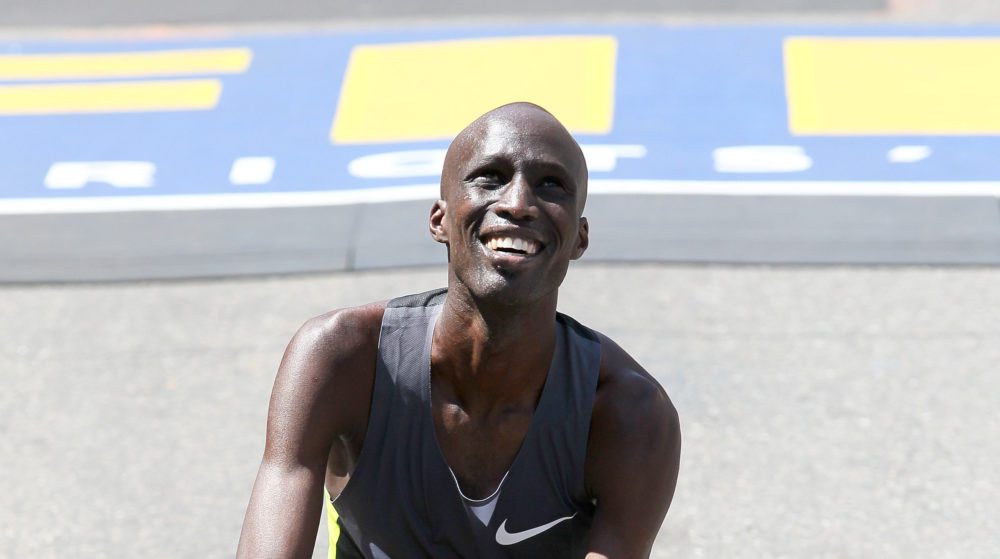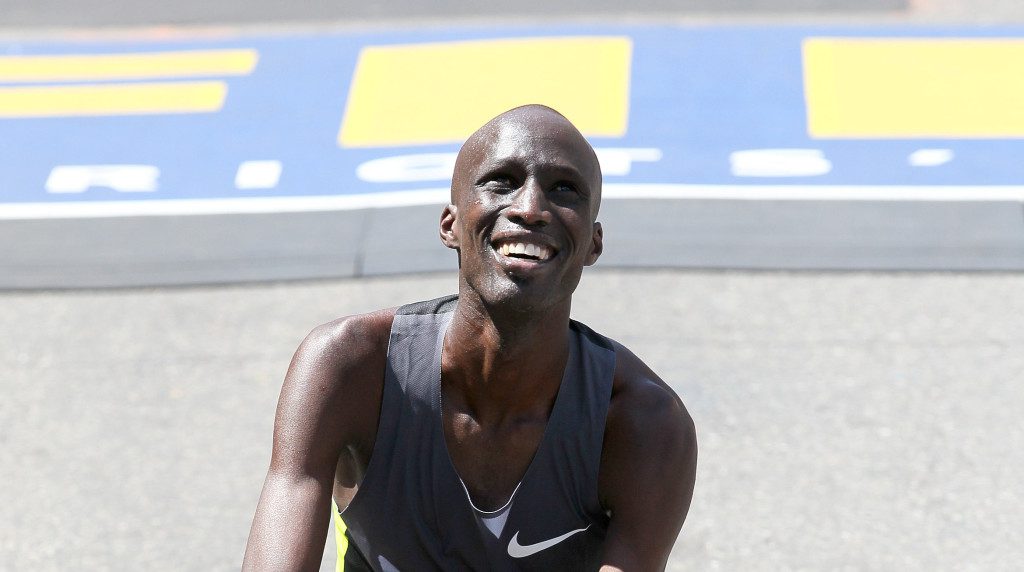Wesley Korir, the world’s most interesting marathoner


Credit: photorun.net
From an impoverished childhood in Kenya to winning the Boston Marathon and now a Member of Parliament in his home country, Wesley Korir may be the most interesting runner in the world.
Married to Canadian runner Tarah McKay-Korir, Wesley Korir splits his time between Canada and Kenya. Wesley grew up in Kenya and went to school at the University of Louisville, where he met his future wife – both were there on running scholarships. He has since won the 2012 Boston Marathon, been elected a member of parliament in Kenya and started the Kenyan Kids Foundation to help educate children in his home country. A documentary about his extraordinary life is being released in September.
We sat down with Wesley before the Ottawa Marathon last May to reflect upon everything that he’s accomplished and what he’s looks to achieve in the future.
First, what makes you want to race Ottawa?
It’s an opportunity, first of all, as a member of parliament to come to the capital city of Canada and get to interact with the members of parliament here. I had meetings here with members of parliament and politicians about what they do. Also, there is the opportunity for my whole family to race: my wife can run the 10K, my mother-in-law can run the 5K, my father can run the 2K and I do the marathon, so it’s a family affair here in Ottawa. As a Boston Marathon winner, you have options to run different marathons and those are things I looked into, but I knew I could do this as a family and make it fun.
You’re an MP in Kenya. Why did you want to meet some of the Canadian MPs?
I think it’s just development cooperation. I wanted to see what they do here, how they do it here, how dedicated they are and what Canada is doing better than Kenya. There are a lot of things that I have learned, both good and bad. I want to take back the good things and use them and also make connections on the issues of development. Canada is doing a lot of good things in Africa and I want to invite them into my area and invest in a good relationship.
You weren’t involved in politics growing up. What made you want to get involved in Kenyan politics?
I was and continue to be motivated by frustration regarding my desire to see better quality of life in Kenya and my realization that the problem is not the finances or resources, but rather the leadership that we have. I want to change things from the inside. So, I started the Kenyan Kids Foundation when I was in America and we are educating kids and doing good things, but it can be frustrating because despite our efforts, their families are still poor. Why? The reason is that the government is not doing it’s job and the leaders are not doing their job. I want to get in there and fix that. I want us to get to the point where no one has to go through World Vision to sponsor a child because the family can take care of their child. I’m trying to make sure I provide the leadership to let them do that.
How did you break into politics?
I think the way it happened to me was having the background of a runner. Winning the Boston Marathon, that definitely helped me financially, but it also helped get my name out in Kenya. It is due to my running that I am already known figure in the country. My actions within my village with the foundation also helped. I was helping about 250 students got to school, I’d built a hospital and got an ambulance, so the people saw ‘hey, this guy has a heart.’ They saw that and had hope for a better future.
Explain the foundation and tell us how you found the opportunity and the time to start it.
I was born into a poor family. The opportunity for me to go to America was a gift from a priest. This priest came to Kenya and he paid for my high school because in Kenya high school is not free. If he had not paid for my high school I would never have been able to come here. It was because of that opportunity that was given to me that I want to help others now. So, I called the priest and said ‘I want to pay back your money,’ and he said ‘no, do the same for other people.’ So when that opportunity came I sponsored two kids myself and that developed into a foundation. Now we’re helping about 200 kids.
You didn’t start at Louisville, correct?
No, I didn’t start at Louisville, I started at Maurry State in Kentucky and moved to Lousiville.
How did going to school in the United States shape who you are now?
My coach and others in the community shaped me to be who I am today. When you grow up in Africa, you’re growing up in poverty, you’re growing up in corruption and you grow up stuck in the same way of doing things. People in Kenya need to learn there are ways to do things without corruption. They need to be honest. They need to be on time. These are leadership qualities that I learned being in America, not in Kenya. The people who want to become leaders in Kenya, I tell them to come here and learn a new culture and take that back with them to Kenya.
What are some things Kenya can learn from the system of Parliament we have in Canada and vice versa?
I think one thing Kenyans can learn, and I learned myself here, is education. It’s education that provides a good life for Canadians. When I was here I saw that. Every MP you talk to, you can see that selflessness and desire to do a good job for the people. That desire is missing in Kenya, it is overshadowed by the politics and selfishness. Too many leaders in Kenya have wanted to know what they can do to become a better politician at the expense of other people.
One Kenyan practice that I think Canadians could learn from is how we do questions. Here, Canada does question period and I don’t think that’s the very best way of doing things. I like the system that we have in Kenya where you ask a question and the question takes up to about two weeks. First, people research; we’re not trying to trick the other politician, we’re trying to get answers to questions that really affect people. Those answers might not be in their head and it might take two or three days to really know what is going on or to find a truly comprehensive answer. I like to argue my point after I really understand it. I don’t want to argue about something I don’t fully understand. Here, it seems everyone is trying to trick the other politicians so that they can make their party look better. I thought that was not good for the country.
You met your wife, Tarah, when you were at school in Louisville. You now have two young children. How has your life and training changed from four or five years ago?
It’s definitely very different. Having my family definitely changed things. I’m now a father, which is the first thing and also I’m a member of parliament and have 300,000 people who I represent. Plus, I’m still an athlete. It’s a load. In the past it used to be just me and running. Then the kids and my wife came in and it was my family and running. Now I have a bigger family of 300,000.
CR: How do you find the time?
I have to adapt to how things are done. It involves a lot of discipline, a lot of programming and a lot of real dedication towards what you want to do. It teaches me to know that I cannot do everything by myself. I need to delegate to others who can do it for me and together we can have a team that will shape Kenya.
How do you split your time between Canada and Kenya?
I will spend most of my time living in Kenya and come here for races. As an MP, we are full time for about three or four months and then we have one month off. That’s when I come here and spend time with my extended family and train.
Presumably moving to Kenya was a major change for Tarah.
Yes, it was a big change for her, but she had been there before with me. Kenya is where we got married and we were always going there for visits so it was really an easy switch.
There’s a movie coming out about you. How was it having a film crew follow you around?
It’s exciting. It’s a lot of pressure but I like the movie. When they were doing it all, I didn’t know how it was all going to come out but just seeing the end product of it, I’m very pleased. All the actions that have come out of it are amazing. It’s amazing how people are motivated by it. I’m excited that it can help people become better people.
Did having a movie crew around all the time draw more attention to you?
Having these people try and film you all the time is definitely eye opening and made me stand apart from other politicians. Those politicians would arrive places by themselves and I would arrive with not only movie people, but people from Canada. The white people that followed me around were amazing for bringing attention to what I was doing.
Looking forward 10 or 15 years, presumably when you’re done running professionally, what goals do you have for the foundation and as an MP?
I think one thing I want for the foundation and as a member of parliament is for people to work together for empowerment. Empowering the people of Kenya so they can become self-sustaining will be my number one goal. In the past five years I have woken up in the morning to have between 200 to 500 people outside and I want in the next five years for that to reduce.
CR: Sorry, can I jump in here? Why are these people waiting outside?
They want money. Some of them need money for school fees, some need money for food, they need money for all these things. I want to give them the ability to go and pay for these things without coming to me and empower them to be able to take care of their families.
What are the largest hurdles Kenya faces in getting to this place where there is better education and people feel empowered and maybe want to emulate what you’re trying to do?
I think the biggest is leadership. The problems we’re facing in Kenya are from leadership. We need good leaders. We need leaders who are selfless. We need leaders with a plan that will help Kenya. We tend to find leaders who are rich, they are from rich families, they are from the son of the president, the son of the former president; they have made it in life. They were born to a rich family and never really saw anyone poor. They see these things on TV. We need leaders who are really relating to the people and the problems.
Another problem is that we have leaders who think that they know everything. We need leaders that know they don’t know everything and want to learn from the people. That’s what I’m trying to do and see what it really is that these people are doing and make it better.
How does Tarah keep you sane through all of this?
It’s stressful for her, but she’s playing a big role, a very big role in even just simple things like what we post on Facebook or what we write or say and how we react to other things. She helps me to really stay focused. When I get frustrated, she helps me to be able to say ‘okay, we’re here for a reason, we’re here for a certain purpose, so stay focused.’
How can Canadians helps the people of Kenya, above and beyond just aid money?
I think, first of all, what they can do is invest in leaders. We need to stop the idea of just going and giving aid as a government or going there and donating. It’s not about donations, it’s about the leadership. If we can focus on raising good leaders for Kenya, then we can solve the problems of why we need the aid dollars. We have good resources, we have good farms, we have everything, but we need people who know how to use the resources available to help the people.


